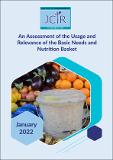An Assessment of The Usage And Relevance of The Basic Needs And Nutrition Basket
Date
2022-01Authors
Sana, Stuart Ngoni
Kapambwe, Mwamba
Type
OtherLanguage
enItem Usage Stats
73
views
views
48
downloads
downloads
Abstract
The Jesuit Centre for Theological Reflection has for over 30 years been monitoring the cost of living through its Basic Needs Basket (BNB). The BNNB tracks, on a monthly basis, the cost of food and non-food items in order to assess the cost of living for an average family size of five members. The findings from the survey are used by various stakeholders to achieve their objectives and ultimately to improve the social and economic wellbeing of Zambians, especially the poor, marginalised and vulnerable. The study on the usage and relevance of the BNNB Survey was commissioned by JCTR with the primary aim being to establish, from the perspective of BNNB users, their views on the usefulness and relevance of the monthly study. The study targeted stakeholders from various sectors including civil and humanitarian/ development non-governmental organizations, donor community, faith-based organizations, vendors, employers, labour office, workers unions, government ministries and individuals
Description
The users of the BNNB are varied and cut across different sectors of society. The report though is more popular among CSOs that include labour unions, the media, non-governmental organizations (NGOs), faith-based organizations (FBOs) and community-based organizations (CBOs). Furthermore, socio-economic status of the users was identified as an important
determinant of interest in the BNNB reports. For instance, low income men and women traders, exhibited the least interest or knowledge about the BNNB reports. On the other hand, the more educated and financially better off officers in CSOs, academia and government had a better understanding and interest in the results of the BNNB reports. In the same vein, the more informed and affluent householders (interviewed in workplaces as key informants) showed greater interest in the BNNB and had a wider variety of uses.
